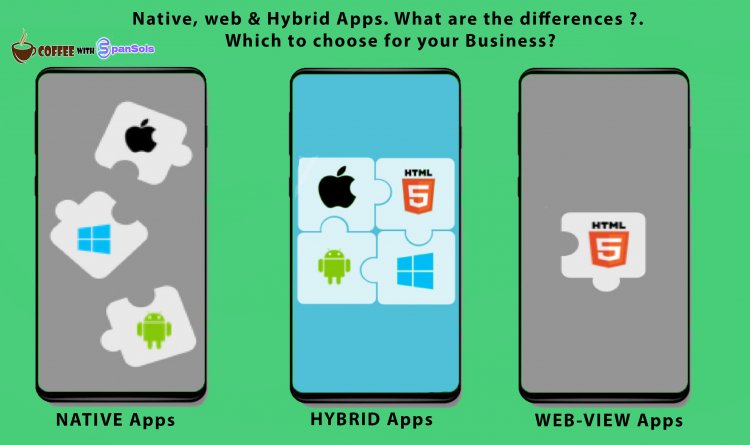Native, web & Hybrid Apps. What are the differences ?. Which to choose for your Business?
Mobile apps can be divided into 3 categories. They are native apps, hybrid apps, and web apps. Each app has its pros and cons. Let us discuss the major differences among these three types. Native Apps, webtoappp, hybrid apps.

Mobile apps can be divided into 3 categories. They are native apps, hybrid apps, and web apps. Each app has its pros and cons. Let us discuss the major differences among these three types.
1. Native Apps:
These apps are installed via the play store (google, AppStore, etc). These apps utilize full features of the device such as camera, location, contact list, SMS, etc.
These apps are designed and coded in particular languages (for ex: Java for Android and Objective-C for ios) and they provide a better and unique user experience by including the integrated features of the phones (like gestures, read SMS, etc.). They keep on functioning offline and can use the device's alert system. They function in accordance with the design and standards of the platform (either android or iOS) which leads to customer satisfaction.
Native apps must be created individually for each platform. A company trying to provide apps on both platforms (ios and android) will need to have different apps for each and coordinate internally for a unified experience. Example: Google Chrome, WhatsApp, etc.
2. Mobile Web App/ Web-view App:
Mobile web app/ web-view app are mobile-optimized web pages, not actual apps but websites. They may resemble a native app in look and feel. The main use of webview apps is to make services, information, or features available for mobile devices when the creation of a native app is not economically feasible.
Many companies turn their web pages into web app for users which can create a native app experience. Mobile optimized web pages of news websites are an example. i.e You may see a difference between the same website when you compare the views on a phone and computer. Web apps have limited functionality and they require an internet connection to function.
3. Hybrid Apps:
Hybrid apps are a combination of native and web apps and are downloaded from an App store. Faster and cheaper to develop than the native, they are better than browser-based web app and are compatible across multiple platforms.
Companies use hybrid apps to grow their presence in the play stores with less investment and less time. Examples of hybrid apps include Facebook, Linked In, Banana Republic, etc.
Which to choose for your Business?
Organizations choose the type of app based on their requirements. For example, if the purpose of the app is to provide content for its readers, a web-to-app is sufficient. Users can decide upon the application's compatibility with device features, need for offline/online task completion, speed factors, ease of maintenance, dependability on platforms, content limitations, ease of installation, and fees involved.
Maintaining a web app is much simpler both for the user and the developer as it involves maintaining web pages while native is complicated as developers need to code the same information for multiple versions across different platforms. A web app is also cheaper in terms of cost and time while submitting an app for the application process. (Read More about the AppStore review process here.)
Spansols is a leading app development company in India that has made over 100 applications both on android and ios platforms. We specialize in ios, android, native apps, and webview apps. We provide perfect apps for your website which are both user-friendly and economical. Our apps boost your business and help you reach your goals.
Talk with our consultants and get how we can help you grow your business. Click here to get a Free Consultation Now.


























